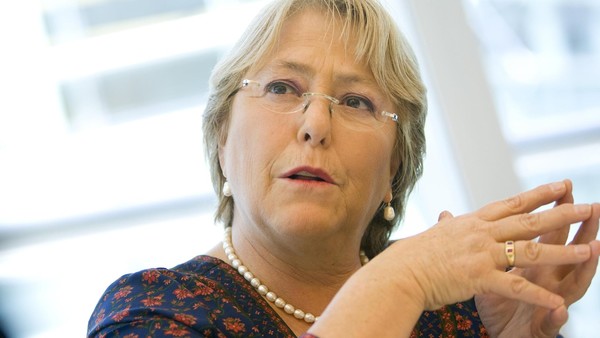December 7, 2014 2:53 pm
For 30 years Chile has been a laboratory for free market economics, with privatised pensions and even a school voucher system designed by Milton Friedman, the godfather of Chicago economics, who once described Chile’s success as a “miracle”.
Yet now Latin America’s most prosperous country may be reversing the experiment, to the consternation of free marketeers everywhere. On a recent visit to Santiago, the capital, Niall Ferguson, the British historian and a darling of the political right, said Chile used to be the region’s “most intelligent country” but now may be “beginning to exercise its right to be stupid”.
Carlos Alberto Montaner, a Hispanic columnist, wrote a strident comment last month saying Chile’s emphasis on economic freedom and civil society “used to be a guiding lighthouse . . . To lose that hurts everyone.”
The reason for their concern is the administration of Michelle Bachelet, the centre-left president. Over the past eight months, it has unleashed 70 reforms, including an $8bn tax increase to fund an educational reform that seeks to expunge market incentives from state schools and eventually health and pensions too.
“The aim is to create the first post neoliberal welfare state,” says Fernando Atria, co-author of The Other Model and an intellectual who is close to the government. “It is a system that recognises the problems of the old welfare state, but also the price that is paid for correcting that with neoliberal solutions, namely inequality.”
As balancing prosperity with inequality has become a concern for the developed world, Chile’s latest economic experiment also remains of global interest, despite the country’s small $350bn economy and population of only 17m.
The snag is that many fear the anti-market methods promoted by Ms Bachelet, whose presidency follows that of billionaire businessman Sebastián Piñera, could break Chile’s so-called “model”. This has slashed poverty rates from 60 per cent to 9 per cent, among the lowest in Latin America, but at the cost of unequal income distribution, among the region’s worst.
“I assume Ms Bachelet wants to be a successful president, but the multitude of her reforms and their character have dashed confidence and brought so much uncertainty that nobody wants to invest,” grumbles Andrés Santa Cruz, a businessman, who criticises the poor drafting of the latest tax code, which increases corporate taxes to 27 per cent from 20 per cent.
“These tax uncertainties alone make it impossible for companies to calculate rates of return on new investments,” he adds.
In principle, almost everyone agrees that investing more in education makes sense as it could help build human capital and see Chile advance out of “middle income status” and into the ranks of the developed world.
However, banning students from using vouchers to attend for-profit schools and prohibiting schools that receive public subsidies from receiving top-up payments from parents, also goes against the market-based system. That has startled Chile’s close-knit and conservative business class, which fears the return of statist policies once endorsed by socialist president Salvador Allende in the 1970s.
“You can feel the past lying heavy on the country,” says one foreign investor with experience of the country. “Everywhere, there are ghosts.”
Compounding the uncertainty is that the reform drive coincides with the end of a commodity boom that has seen the price of copper, which makes up half of Chilean exports, shrink 12 per cent this year. In the third quarter, economic growth collapsed to 0.8 per cent, from almost 5 per cent a year ago, while investment contracted 10 per cent.
Amid the abrupt slowdown, critics joke that Ms Bachelet’s unwieldy coalition, “The New Majority”, is much like Christine Lagarde’s “New Mediocre”, as the head of the International Monetary Fund recently described the world economy. Certainly, business confidence has fallen in the gloomy atmosphere, while Ms Bachelet’s popularity has plummeted to 42 per cent from 58 per cent in June.
For many outside observers, though, the poisonous debate about the “end of Chile’s miracle” is a storm in a teacup. Foreign companies continue to plough money into Chile. This year, Abbott Laboratories of the US spent $3.4bn buying local company CFR, while Itau, Latin America’s biggest bank, diversified outside Brazil with the $2.2bn purchase of Corpbanca.
Moreover, education reform is funded by tax increases, unlike the social policies of regional spendthrifts such as Argentina or Venezuela. That should ensure macroeconomic stability, in principle. The macroeconomy has also responded to the end of the commodity cycle. “Chile is the only Latin American country that has started a sound external balance adjustment,” Bank of America Merrill Lynch wrote in a research note.
Nonetheless, ideological debate rages. “The government has explained itself very poorly,” admits one insider. “It needs to circumscribe very clearly those areas that will not be market-based. We are not talking about revolution.”
Eugenio Tironi, a leading sociologist, agrees. He points out it was Mr Piñera, the billionaire former president, who first “broke the taboo” of raising corporate taxes. Checked by her falling popularity among the middle class, Ms Bachelet’s reforms, he says, will emerge from Congress “not the roaring tiger so many fear, but more like a cat”.





No comments:
Post a Comment